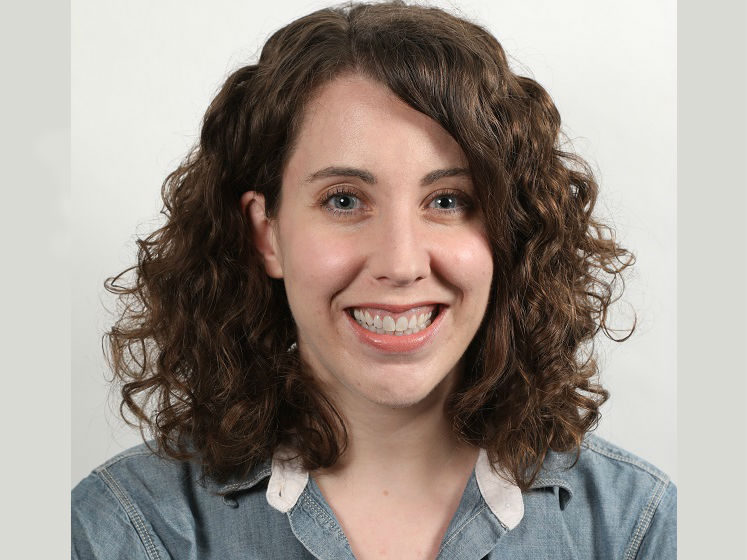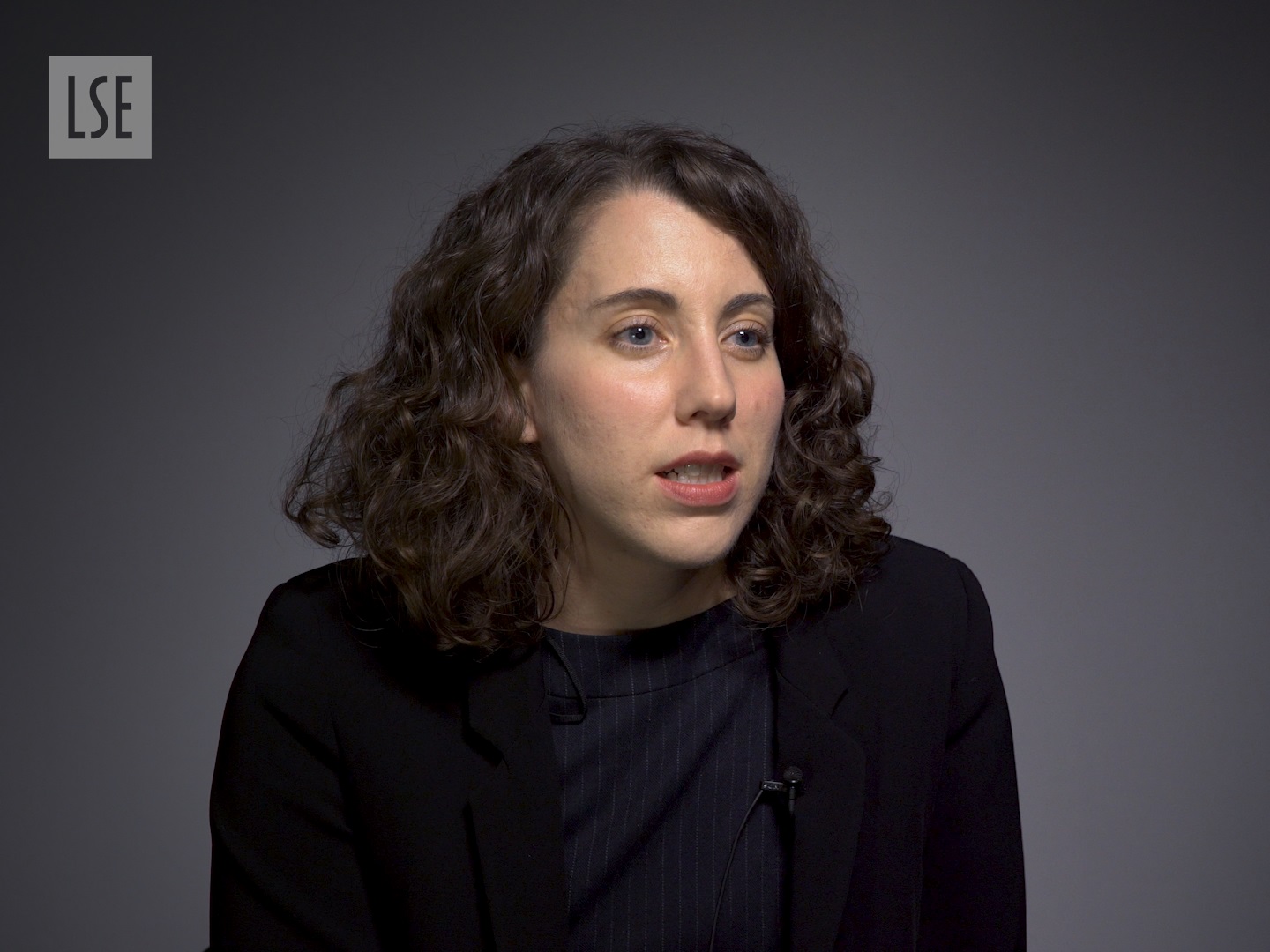 Katharine Millar
Katharine Millar
Katharine Millar is Assistant Professor in International Relations at LSE.
Tell us about your background
I grew up in rural Canada and did my undergraduate degree at the University of Alberta, Edmonton, where I studied political science. As for so many political science students, it was a mind- and world-opening experience, and I loved it. I had a lot of the same questions that undergrads and political scientists in international relations have: Why do wars happen? Why do people continue to use violence to resolve conflict? And why do certain types of violence – and certain types of weapons – seem to be more acceptable than others when all of it ends up harming people? I was interested in the failure to effectively regulate the trade in small arms and light weapons, which became the topic of my undergraduate honours dissertation.
Following that interest, I moved to Geneva, to pursue a Masters in Political Science at the Graduate Institute of International and Development Studies, which hosts the global research centre of excellence on small arms – the Small Arms Survey. I very nearly went to law school but changed my mind at the (very) last minute. I was lucky enough to have one of those amazing, life-changing professors, who at one point told me, “You should go to law school if that’s what you want. But if you’re wondering if you could do grad school, you can and I think you’d be good at it.” While I’m sure I would also have been happy as a lawyer, it meant a lot to me to have a professor take the time to understand my interests and my goals, and give me that little bit of a push. (Thanks Andy!) It’s something I try to remember in my life as an academic, and use to inform my own teaching and mentoring practice.
You’re currently working on your first book. How have you developed your research on gender, violence and political community since your undergraduate degree?
How much time do you have? [Laughs]. Let’s see if I can give the short version of that story. So, during my Masters I began thinking about the limitations of understanding the small arms trade as purely a material matter of tracking and controlling physical items. That doesn’t seem to be the entire story. Why can we ban landmines and cluster munitions but haven’t been able to get a handle on small arms? There are a lot of reasons, but one is probably a different underlying military rationale. So far, small arms have never not been useful, whereas global militaries can now often work around land mines.
There’s also an interesting ideological association between small arms and the state. We associate small arms and light weapons with policing and with military activities that are often socially considered to be legitimate, which may make it harder to work up moral outrage about guns per se. (Which is not to mention the role of capitalist defense industry incentives, geopolitical concerns, etc.). But because I was mostly interested in this normative – or moral/ethical – relationship to types of violence, I moved from looking at guns themselves to looking at militarism: the relationship between society and the military; democracy and the military; and the ways in which appeals to military symbolism and to values and ideals can be quite politically effective. And so in the end, the topic I worked on in Geneva was the historical relationship between democracy and militarism.
After that, I was lucky enough to study and teach at the University of Oxford with a fellowship from the Canadian Social Sciences and Humanities Research Council, which funds doctoral education abroad. My doctoral project was another extension, or iteration, of my ongoing interest in the way we culturally and ideologically organise around violence.
I wanted to move past militarism, which as an idea has a tendency to make violence look more unusual, and distinct from politics, than we actually experience it to be in practice. I wanted to think through the political processes and power relations that make certain forms of violence normal, and then think about how they relate to political belonging. Thinking, again, about what makes war possible: How does collective violence relate to the way we make up political community? The answers that I looked at were the gendered dynamics of citizenship and obligation that we see articulated through “support the troops” discourses and movements in the US and UK as one way of thinking about how the organisation of violence.
In other words, I wanted to know how “we” ethically relate to those who commit (and risk) violence for the group, and, especially, how these expectations are really informed by gender norms. To some degree, it’s the third take on my guns project – but from a much more explicitly feminist perspective.
And it’s become my book project, which I’m working on this summer. The book is called Violent Obligation: ‘Supporting the Troops’ and the Making of Political Community and it’s the result of over five years of research and thinking, and I have a lot of confidence in the project going forward. I think it’s going to make a really substantial contribution to the ways we think about the relationship between gender, violence and political community. The ways gender (as well as race, class, coloniality, sexuality, etc.) and violence may, counterintuitively, help political communities hang together – in ways we may not necessarily find to be positive or desirable - seems to be increasingly important in contemporary politics. I’m really pleased to be placed to be able to provide an innovative perspective and strong contribution to these types of conversations and questions.
What does your role as an Assistant Professor at LSE involve?
I teach undergraduate and graduate courses in feminism and international politics and I’m the programme director for our International Relations Theory and International Relations Research Masters degrees. I also convene our core graduate International Relations Theory course. Other than that, it’s a lot of teaching, dissertation advising, student support, and so forth.
 International Theory video
Academics and PhD candidates look at the issues and theoretical approaches to international theory at the Department of International Relations LSE
International Theory video
Academics and PhD candidates look at the issues and theoretical approaches to international theory at the Department of International Relations LSE
I’m pleased and humbled that I’ve been recognised by the Students’ Union for inspiring teaching two years in a row. I’m really touched, especially as I’m new to LSE, and I’m really appreciative of the effort taken by my students to nominate me. I know that students have a lot of demands on their time, from school to jobs to family to career plans, and so for them to take the time to recognise my teaching practice and academic expertise means a lot to me.
It’s a very rewarding, if challenging, time to be teaching and thinking about gender and politics. As a society, we seem to be, in quite a productive way, questioning subtle truths and conventional wisdoms and potentially harmful long-standing practices. And we’re not done working through these big conversations about gender equality, masculinities, formal and substantive LGBT rights, responding to sexual harassment and discrimination yet, so we – academics, students, everybody – can all participate. There’s so much big thinking – and, of course, social and political action – to be done.
What did you do before arriving at LSE? Could you see yourself doing a different job?
For a while I thought I’d like to work in party politics – and I may again yet! I was a policy researcher for a major political party in Canada before pursuing my doctorate. It was a crash course in learning a huge amount of information about disparate policy areas. The topics I worked on varied day to day – or even hour to hour. It was demanding but really exciting, working to provide the elected officials with strong, politically- and ethically-informed analysis on really (really!) short deadlines.
Other than the time element (and I now realise what a privilege, it is, in academia, to be able to spend substantial time considering these important social and political problems), I believe there are a lot of similarities in being engaged in the political system as an active practitioner and being engaged in thinking about critical questions about politics and ethics in an academic setting.
What do you enjoy most about your job?
One part is getting to know my students. My aim is to provide them with the skills and the information to reflect on their own beliefs in a critically informed way. One of the amazing things about teaching gender and politics is that while gender is obviously personal, thinking about gender helps us to see how broader, seemingly-bigger things like the international political economy, or conflict, are actually personal too. It’s sometimes harder to see how all of our lives are related to the ways in which these large-scale processes and organisations operate. If we’re open minded, gender analysis and critical theory have the potential to shift our orientation to thinking in really creative ways, about what we study, about our degrees, about ourselves, and about how we relate to the world. It can be really powerful.
There are many jobs that are intellectually and creatively rewarding and it’s a privilege to hold one of them. A huge part of what I do, like any academic, is to think about big challenges, and difficult, troublesome things, and work them through on a long timeframe in a lot of detail, and to discuss them with colleagues and to push the envelope of what we know. I can’t think of a better job.
It can be a challenge, but a condition of academic life is balancing a strong commitment to students with producing intellectually-engaging and socially meaningful research. It’s what we all want to do.
Katharine's nomination
Katharine was nominated by Astrid Marie de Geyer d’Orth (MSc International Relations Theory 2017) who said:
I decided to nominate Katharine Millar for #LSEwomen not only because her legendary “How so?” question during the seminars encourages us to challenge and give the best of ourselves when (re)thinking the international. But also, and above all, because throughout her insightful academic and personal advice as well as her constant attempt to both support us and keep being a brilliant researcher, she is the example that you can be inspiring in every little thing you do for others, and the proof that women in academia are an impulse to do better.
Read more
Department of International Relations
Katharine Millar's profile